A digital identity for every citizen on the globe has been identified by the World Bank and World Economic Forum as an important part in the realisation of the Sustainable Development Goals. The right to a legal identity is a part of Global Goal 16 (Peace, Justice and Strong Institutions). An effort to achieve this is the ID2020 Alliance. A Public-Private Partnership between United Nations agencies, World Economic Forum, Foundations and Big Tech-corporations. Their grand goal do however raise some concerns about loss of privacy, mass surveillance and population control. It comes with a price that might have severe implications for the freedom of man.
ID2020 was founded in New York 2014 by John Edge, an expert on how Public-Private Partnerships can solve the sustainability goals with the help from blockchain and artificial intelligence technologies.
The organisation, that was supported by law firm Kaye Scholer, technology conglomerate Red Rose Corporation and the merchant bank Broadhaven, held their first meeting in September 2015. Their stated mission was to give a digital identity to everyone through “leveraging start-up models” and in the end create a system that would span the globe, including the 1 billion people that currently have no proper identification.
Their first meeting, coinciding with the adoption of the United Nations 2030 Agenda for Sustainable Development, was connected to Global Goal 16 with its sub target 9 to “by 2030, provide legal identity for all, including birth registration”.
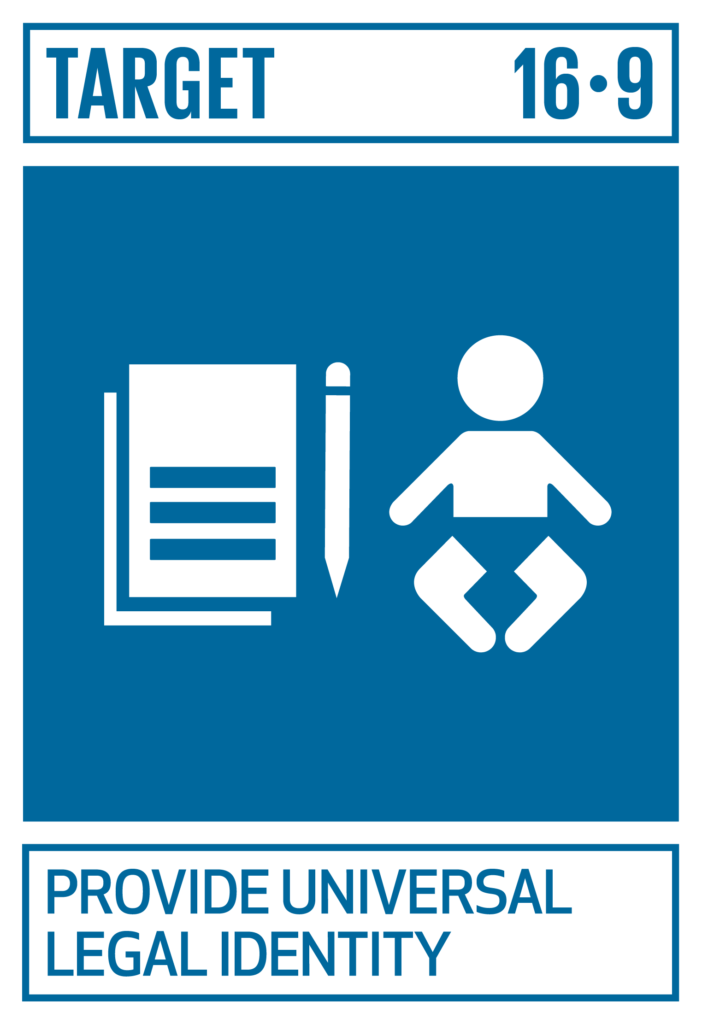
ID2020 got a more solid ground at the United Nations annual summit in May 20, 2016, gathering industry leaders, NGOs, governments, emerging technology pioneers, and cross-industry experts to “foster a global conversation and build a working coalition to identify and build the enabling conditions for the creation of a legal digital identity for all individuals at risk.” Speakers came from The World Bank Group, The European Association for e-Identity & Security, Commonwealth Secretariat, Center for Information Assurance and Cybersecurity, MIT, PSG Solutions, LLC., Verizon. Several of them were also contributors to the World Economic Forum that has since been a significant player in the development of a Digital ID.
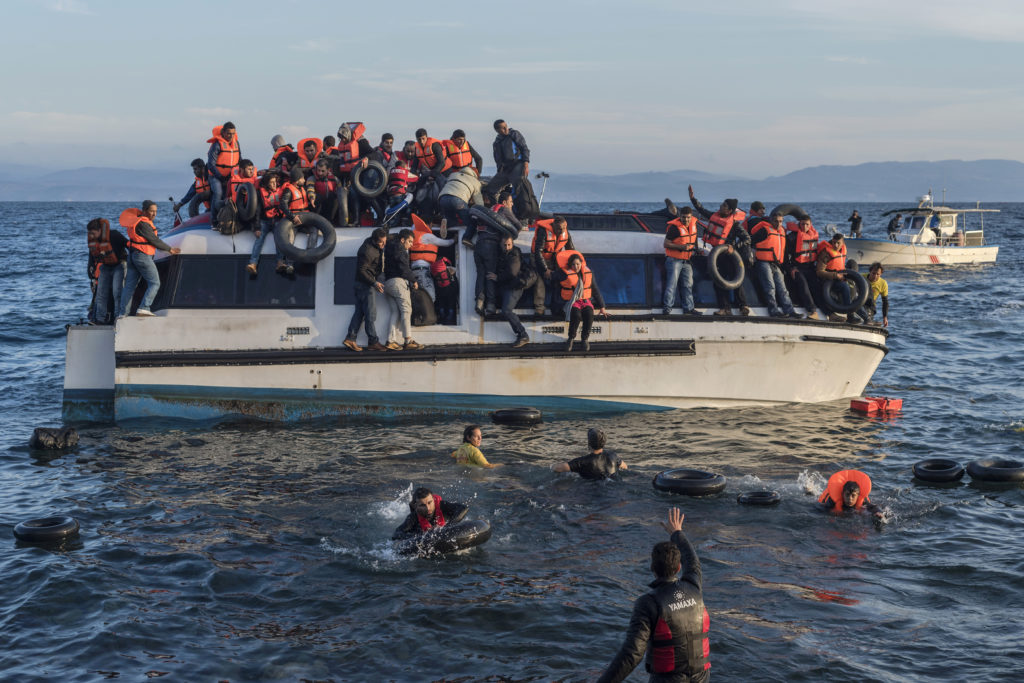
The main topics discussed were how identities for refugees could be handled and how the Global Goals could be advanced through public-private partnerships . The European migrant crisis in 2015 had highlighted the problem with people who could not prove their identities (“paperless refugees”). The solution was at hand. A digital ID would soon be possible with the help of emerging technologies like blockchain and world wide broadband connectivity.
The rapid proliferation of smart devices globally, combined with ever-increasing computing power and rapidly expanding broadband coverage, enables new methods of registration and facilitates ongoing interaction between individuals and their identity data.
New technologies, including blockchain, when used in conjunction with long-proven technologies, such as biometrics, now make it possible for all people to have access to a safe, verifiable, and persistent form of technology. (ID2020, “digital identity”)
The following year, at the annual summit 2017 in the United Nations ECOSOC Chamber, ID2020 adopted “the platform of change” and started the ID2020 Alliance, with funding from major donor Rockefeller Foundation and the digital technology consultant firm Accenture. Other founding partners were GAVI – The Vaccine Alliance, Microsoft and IDEO.org (a design and consultant firm with partners like The Rockefeller Foundation, Bill & Melinda Gates Foundation, and The Bezos Family Foundation). Participants included Intel, IBM, Verizon, Samsung, NEC, and SAP. The Alliance featured a very tight connection between big tech companies, foundations, and vaccine and health interests.
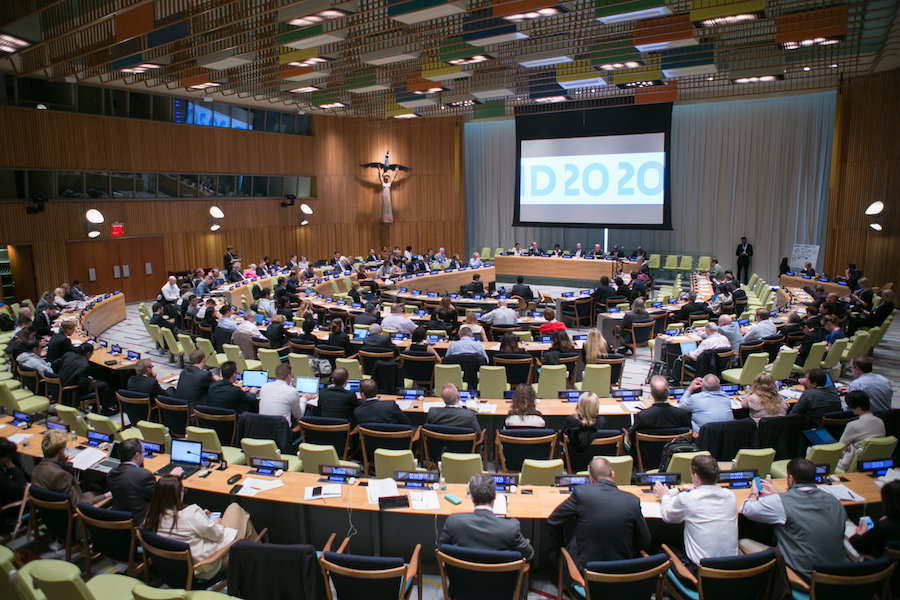
The alliance began to develop a plan to test new identification solutions and work with governments and agencies to implement them:
By 2030, the Alliance aims to have facilitated the scaling of a safe, verifiable, persistent digital identity system, consistent with Sustainable Development Goal 16.9. From 2017 to 2020, the Alliance’s work will focus on two areas: developing and testing the best technological solutions for digital identity; and, working with governments and existing, established agencies to implement these solutions.
Speakers included representatives from the mentioned partners as well as by United Nations agencies such as UNDP, The UN Refugee Agency and Office for the Coordination of Humanitarian Affair (OCHA). At the summit a key question was what prevented them “from solving this challenge?” They had, however, the ultimate problem for their solution in their pockets. In a report that World Economic Forum published the same year it was stated that:
In the current global geopolitical and security context, the issue of security is foremost. From terrorism to the fear of pandemics, government, business leaders and travellers alike are concerned about security and safety as they cross borders. (WEF, Digital Borders Enabling a secure, seamless and personalized journey)
Members of the ID2020 board included Dr. Seth Berkley CEO from The Global Alliance for Vaccines and Immunization (GAVI), a member of Council on Foreign Relations and previously involved with the International AIDS Vaccine Initiative (IAVI), the Health Science Division at Rockefeller Foundation, Center for Infectious Diseases, and the US Centers for Disease Control (CDC). Seth Berkley was/is also a longtime contributor and participant at the World Economic Forum. Other board members had experiences from the Department of Defence, JP. Morgan Chase, UBS, Microsoft, Accenture, and Morgan Stanley.
GAVI was founded by Bill and Melinda Gates Foundation, Rockefeller Foundation, UNICEF, The World Bank and WHO at the annual meeting in Davos in 2000 with the mission to vaccinate children in the world’s poorest countries. It had grown out of the Rockefeller-supported The Children’s Vaccine Initiative (founded in 1990). Control of vaccination and infectious diseases was to become one of the pillars to achieve a digital ID regime.

Another intriguing coincidence is that one of the advisors to ID2020 is futurist Peter Schwartz. A specialist “in scenario planning, working with corporations, governments, and institutions to create alternative perspectives of the future and develop robust strategies for a changing and uncertain world” and currently employed as Senior Vice President for Global Government Relations and Strategic Planning at Salesforce. Schwartz led the scenario-team at Royal Dutch Shell in the 1980s, that famously predicted the downfall of the Soviet Union. His climate change report, written for Pentagon in 2004, forecasting European cities under water and Britain as a Siberian wasteland by 2020 did however somewhat disgrace his reputation.

As chairman of the firm Global Business Network he was involved in the Rockefeller Foundation report Scenarios for the Future of Technology and International Development from 2010 that contained the scenario Lock Step. This scenario describes a world struck by a pandemic leading to panic, tighter top-down government control, more authoritarian leadership and technological surveillance measures. The resemblance of what has played out during the Corona Crisis are quite shocking. As Peter Schwartz wrote in the foreword to the report:
The Rockefeller Foundation has already used this project as an opportunity to clarify and advance the relationship between technology and development. Through interviews and the scenario workshops, they have engaged a diverse set of people—from different geographies, disciplines, and sectors—to identify the key forces driving change, to explore the most critical uncertainties, and to develop challenging yet plausible scenarios and implications. They have stretched their thinking far beyond theoretical models of technology innovation and diffusion in order to imagine how technology could actually change the lives of people from many walks of life.
Rockefeller Foundation clearly views the crisis as an opportunity to change the system. The transformation might hurt but in the end their promised digital Utopia will arise out of the ashes of the obsolete old system. What now plays out is a part of a centuries old population control agenda that was initiated by the Rockefeller foundations and now are carried out by close partners like Bill & Melinda Gates Foundation (an agenda described and analysed in my book Rockefeller – Controlling the Game).
Before the Corona Crisis started to make an impact and create havoc on the world economy, GAVIs CEO Seth Berkley wrote an article for World Economic Forum (We all have a stake when it comes to global health security, published 16 January 2020) with an indication of what lay ahead of us:
At a time of increasing nationalism and a rejection of globalism, infectious disease is a reminder that we are interconnected and all have a stake in global health security. (Seth Berkely, GAVI)
The COVID-19 outbreak, with all its tragic consequences, happened to be the perfect trigger event to show the world the need for a global coordination and management of the planet, as well as the need for technological surveillance regime in order to track and monitor all people and diseases (and the global value chains). The remedy comes with a tighter surveillance and control. As Bill Gates was quoted saying in an conversation with TED Talk CEO Chris Anderson:
Eventually we will have some digital certificates to show who has recovered or been tested recently or when we have a vaccine who has received it. (Source)
Bill new what he was talking about. On May24, 2019, the European Commission presented a roadmap for the implementation of actions on strengthened cooperation against vaccine-preventable diseases. The goal was a common vaccination card/passport compatible with electronic immunization systems for EU citizens by 2022 (as well as countering vaccine hesitancy – the anti-vaccination movement).

The measures for handling the pandemic open up for the ID2020 certification, and in the end for a global digital citizenship – a fundamental pillar in the technocratic smart society (4IR) pushed by World Economic Forum to support the United Nations Sustainable Development Goals.
Berkley’s article coincided with World Economic Forum’s release of the White Paper Reimagining Digital Identity: A Strategic Imperative. A paper written with financial support from the ID2020 partner Accenture with the message that the world is in need for a more secure digital identification because of “fraud, identity theft and misuse or abuse of personal data” in the current fragmented systems.
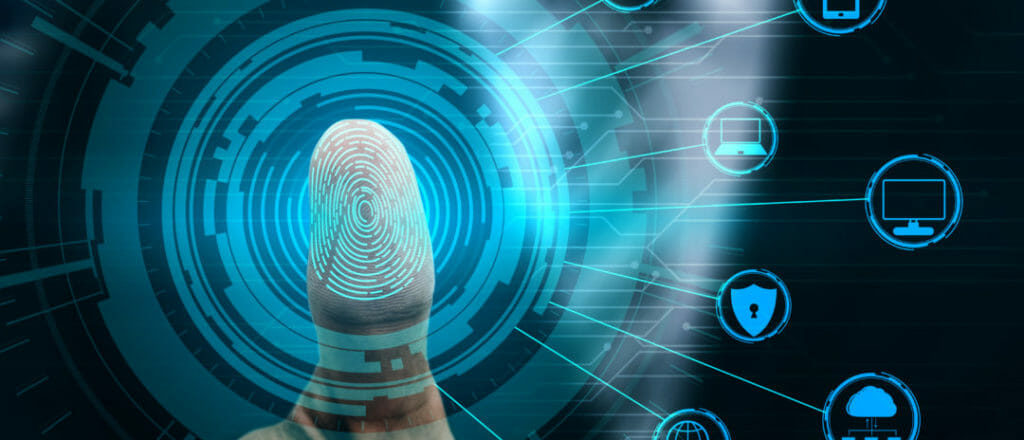
The white paper is a part of “The Platform for Good Digital Identity” that have been running since 2018 in order to “advancing good, user-centric digital identities”. Partners include ID2020, Accenture, Bill & Melinda Gates Foundation, Cisco, The World Bank, European Commission, United Nations and newly founded advocacy groups like One World Identity, World Identity Network and Security Identity Alliance. It is a big push which, besides refugee identification and disease control, is packaged as a solution to concerning issues like human trafficking and child marriages. But it comes at a price. As the partner The World Bank explains it:
Digital technologies, such as cloud computing, biometrics, mobile networks and devices, and smartcards, can increase the security, accuracy, and convenience of identifying and authenticating individuals. As public and private service providers increasingly transition into the digital realm, the ability to prove who you are will be essential for participation in the digital environment. (The World Bank)
In the utopian smart society that is currently being built, digital identity will be required in order to access all basic human services like healthcare, e-commerce, travel, financial services, and social platforms. Without it, you cannot participate. This system can then be connected to the “Blockchain-enabled citizen loyalty and reward platforms” that World Economic Forum has foreseen to come. This will, in their view, bring “peace and order” to the world. Just like the Social Credit system in China.
The implementation of a global data platform to assess the “risk” level of travellers, if not through actual data, through a type of “credit score”, would give governments more accurate information about passengers and better protect their borders and citizens.
The ability to effectively pre-vet the majority of passengers would enable government and border control agencies to more easily single out those that require further investigation. (World Economic Forum, Digital Borders Enabling a secure, seamless and personalized journey)
![]()
Some countries, like Sweden and Estonia, are seen as good examples as they are ahead of the rest of the world in this regard, with almost everything done digitally with very small amounts of cash in circulation. In Sweden, it gets increasingly difficult to take part of services and pay for parking tickets or train tickets without a smart phone and digital identification. Communist dictatorship China has also been in the forefront with the use of biometric payment systems (and is now being introduced in Denmark as well). In the wake of the Corona crisis, people all over the world (and in parts that are far behind in terms of digitalization) are now suddenly urged to switch from cash to digital money to “avoid contagion”.

Becoming Transhuman
Smart phone devices, smart cards and biometrics have been used in most earlier projects for identification, but as a smart phones and cards can be stolen or lost, it is not far-fetched to expect that demands for more secure identification methods, like smart tattoos and implants, will become more prevalent as we move closer to 2030. Indeed, this is a development that World Economic Forum has also predicted in their vision for the Fourth Industrial Revolution. Smart technology devices will, during the coming decade, be integrated with our bodies for behaviour monitoring, location data, health functions and real-time identification (Klaus Schwab, The Fourth Industrial Revolution, Shift 1: Implantable Technologies).
Smart tattoos and other unique chips could help with identification and location.
Digital tattoos not only look cool but can perform useful tasks, like unlocking a car, entering mobile phone codes with a finger point or tracking body-processes. (Klaus Schwab, The Fourth Industrial Revolution, World Economic Forum, 2016)
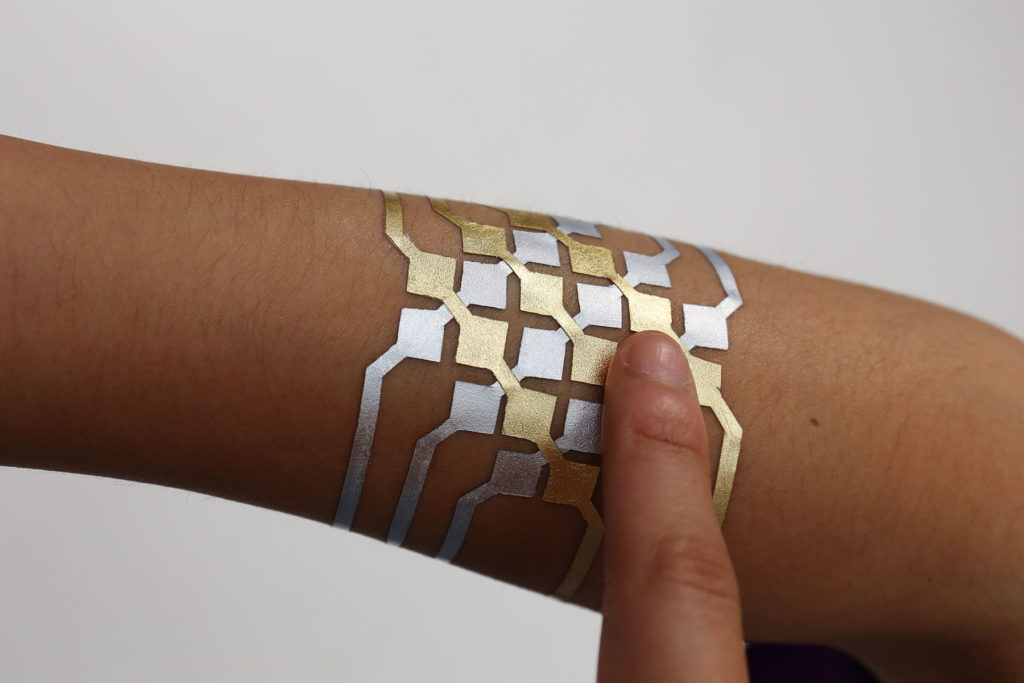
In the article “Thousands of Swedish people are swapping ID cards for microchips” (that was published by World Economic Forum in 2018) the founder of Swedish biohacking group Bionyfiken, Hannes Sjöblad, said:
Who wants to carry a clumsy smartphone or smartwatch when you can have it in your fingernail? I think that is the direction where it is heading. (Hannes Sjöblad, Bionyfiken)
Early start-ups like Swedish Biohax International have offered RFID-implants in humans since 2014 and Danish firm Bichip have developed a chip that can be connected to the Internet and has a unique ID for general identification.
BiChip is the First and the Only Distance readable Human Microchip with Internet Connectivity. Bichip has a unique ID for general identification, and can store your Medical data, Driver license and Passport. It can also be used as an alternative Payment System integratable with cryptocurrency wallets. (Bichip.com)
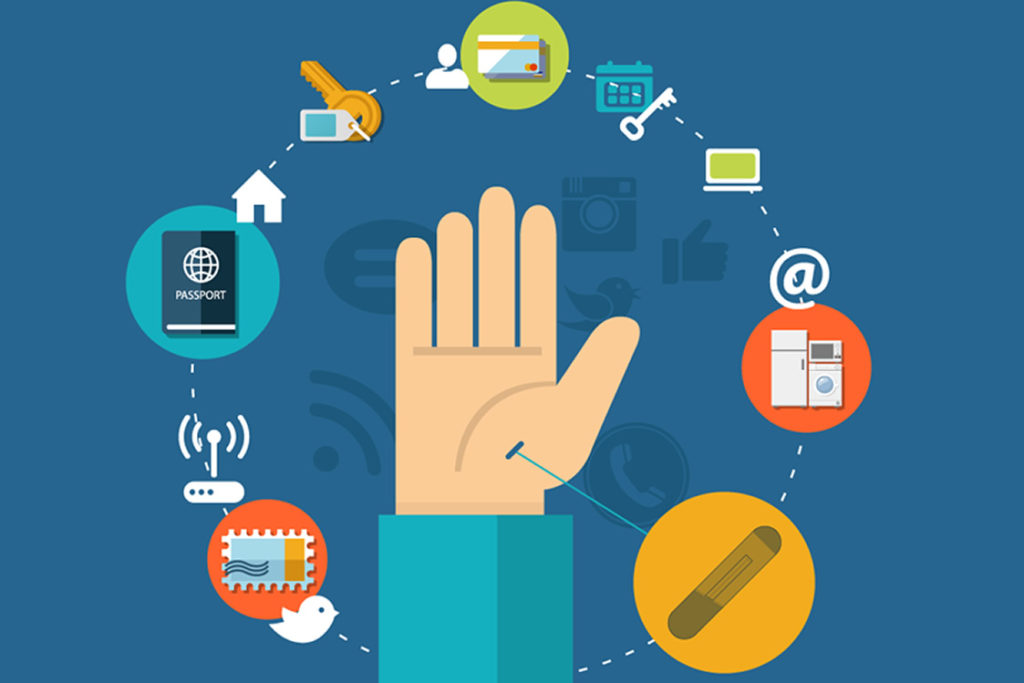
These invasive technologies are, however, not yet a part of the ID2020 project and are more done on a voluntary basis for “convenience” and curiosity by early adapters and tech enthusiasts. The biohacker movement has since 2014 arranged conferences and their initiative Chipster arranges parties there people gets “upgraded”. For now, they are only a small fringe group with its largest following in the progressive Nordic countries. But in a few years time that might change. All that is needed, to paraphrase The Club of Rome, is a crisis that fits the purpose.
COVID-19 reflects a broader trend: more planetary crises are coming. If we muddle through each new crisis while maintaining the same economic model that got us here, future shocks will eventually exceed the capacity of governments, financial institutions, and corporate crisis managers to respond. Indeed, the “coronacrisis” has already done so. (The Club of Rome, 2020)
The drive for a digital ID risks in the end to fundamentally reshape our place in society, with a human race that is more or less forced or coerced to migrate from the physical to the digital realm. If you as an individual don’t accept the ID, you risk being denied access to basic services and a decent life.
United Nations 2030 Agenda for Sustainable Development is in the end a technocratic plan to achieve world domination – A new economic system with a digital surveillance regime that comes with severe consequences for the freedom and future of man. It is essentially a Scientific Dictatorship that requires all things to be digitally connected to function. The Corona Crisis of 2020 has been a trigger event on a scale never seen before in the history of mankind and the ID2020 Alliance and World Economic Forum has wasted no time using it to further their agenda.
We really need to ask ourselves if this is the future we want? If not, the time to act and say NO to this development is now.
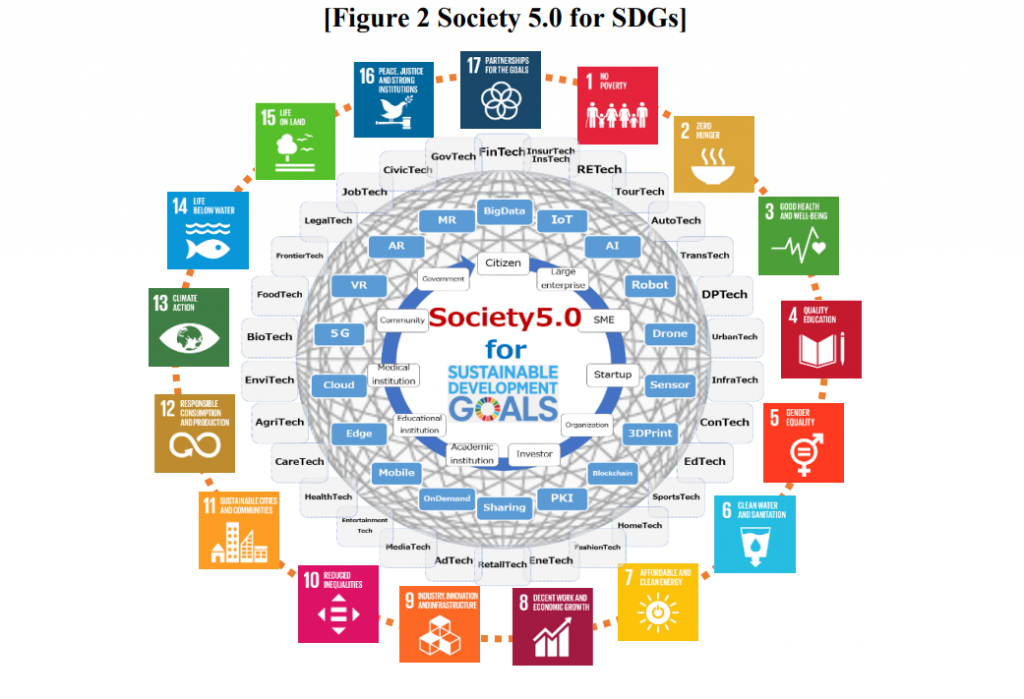
Read more about the background in Rockefeller – Controlling the game (order from Pharos Webshop).
Will also be included in the coming English version of The Global Coup d’Etat.
 Pharos
Pharos
[…] Reisbeperkingen Niet iedereen zou vrij zijn om te reizen. In de toekomst zou voor reizen speciale vergunningen en een geïmplanteerde ID-chip nodig zijn [zie ID2020 ] […]
[…] Eighth International Conference on Climate Change, that the world needs a global pandemic response. “The COVID19 outbreak, with all its tragic consequences, happened to be the perfect trigger event … he said, in a blog post on April 6. […]
[…] As the blog Pharos reported in this new story, Democrats/globalists are rushing to use this crisis to push ‘digital identities for all’ and a digital identification and control system quite similar to what we’ve been witnessing over the past several years in Communist China. With ‘big tech’ and the democrats/globalists already using it to censor alternative points of view as Mike Adams reported in this new story over at Natural News, just imagine America in 2021 should Joe Biden, Hillary or another Democrat win the election in November and the globalists rush their devious plans through without any opposition. From this story over at Pharos. […]
[…] danger of hand sanitizer in a hot car Up to 91 people exposed to virus from hairstylist Corona Crisis Control – Digital Identification For All-SQ-EMPHASIS ON THE WORD ‘ALL’-N… Tech for Contact Tracing Will Be Included in Latest iPhone Update—Whether You Like It or Not […]
[…] Viri: http://pharos.stiftelsen-pharos.org/corona-crisis-control-digital-identification-fur-alle/ – […]
[…] Corona Crisis Control – Digital Identification Für Alle […]
The last 8 years are about to commence within this decade:
https://sumofthyword.com/2016/10/04/the-rapture-of-the-church-is-after-the-tribulation/
This must be stopped immediately! The forced ID of the entire planet will only result in a world full of slaves.
[…] Universiteit in Zweden, toont dit aan dat de wereld een snelle reactie nodig heeft. In een blogpost van 6 april zei hij het […]
[…] et les maladies (et les chaînes de valeur mondiales) », a-t-il déclaré dans une déclaration. article de blog le 6 […]
[…] to track and monitor all people and diseases (and the global value chains),” he said, in a blog post on April […]
[…] to track and monitor all people and diseases (and the global value chains),” he said, in a blog post on April […]
[…] Tatuajele digitale nu numai că arată bine, dar pot efectua sarcini utile, cum ar fi deblocarea unei mașini, introducerea codurilor de telefon mobil cu un punct de deget sau urmărirea proceselor corporale. (Klaus Schwab, a patra revoluție industrială, Forumul Economic mondial, 2016) În articolul „Mii de persoane suedeze schimbă cărțile de identitate cu microcipuri” (care a fost publicat de Forumul Economic Mondial în 2018) fondatorul grupului suedez de bio-hacking Bionyfiken, Hannes Sjöblad; a declarat: Cine mai vrea să poarte un smartphone voluminos sau un ceas inteligent când îl puteți avea în unghie? Cred că aceasta este direcția în care se îndreaptă. (Hannes Sjöblad, Bionyfiken) Întreprinderile nou-înființate, cum ar fi Swedish Bihox International, au realizat implanturi RFID la oameni începând din 2014, iar firma daneză Bichip a dezvoltat un cip care poate fi conectat la internet și are un ID unic pentru identificarea generală. De asemenea, poate fi utilizat ca un sistem de plăți „integrabil cu portofelele criptografice”. BiChip este primul și singurul Microchip uman care poate fi citit de la distanță cu conectivitate la Internet. Bichip are un ID unic pentru identificarea generală și poate stoca datele medicale, permisul de conducere și pașaportul dvs. De asemenea, poate fi utilizat ca un sistem de plăți alternativ integrabil cu portofelele criptografice. (Bichip.com) Cu toate acestea, aceste tehnologii invazive nu fac încă parte din proiectul ID2020 și sunt realizate mai mult pe bază voluntară pentru „comoditate” și curiozitate de către adaptorii timpurii și entuziaștii tehnologiei. Miscarea biohacker a organizat din 2014 conferinte si initiativa lor, Chipster aranjeaza întâlniri in care oamenii se „modernizează”. Deocamdată, acestea sunt doar un mic grup marginal, în cea mai mare parte urmat în țările nordice progresiste. Dar peste câțiva ani, acest lucru s-ar putea schimba. Nu este nevoie decât de o, parafrazînd Clubul de la Roma, criză care se potrivește scopului. COVID-19 reflectă o tendință mai largă: Se apropie mai multe crize planetare. Dacă ne vom confrunta cu fiecare nouă criză, menținând în același timp același model economic care ne-a adus aici, șocurile viitoare vor depăși în cele din urmă capacitatea guvernelor, a instituțiilor financiare și a managerilor de criză corporativi de a răspunde. Într-adevăr, „coronacriza” a făcut deja acest lucru. (The Club of Roma, 2020) În cele din urmă, eforturile pentru o identitate digitală riscă să ne remodeleze în mod fundamental locul în societate, cu o rasă umană mai mult sau mai puțin forțată să migreze din lumea fizică în cea digitală. Dacă, în calitate de persoană, nu acceptați ID-ul, riscați să nu aveți acces la serviciile de bază și la o viață decentă. Agenda Organizației Națiunilor Unite pentru dezvoltare durabilă 2030 este, în cele din urmă, un plan tehnocratic de a obține dominația mondială – Un nou sistem economic cu un regim de supraveghere digitală, care are consecințe grave asupra libertății și viitorul omului. Este în esență o dictatură științifică care necesită ca toate lucrurile să fie conectate digital pentru a funcționa. Criza Corona din 2020 a fost un eveniment declanșator la o scară nemaiîntâlnită până acum în istoria omenirii, iar Alianța ID2020 și Forumul Economic Mondial nu au irosit timp folosind-o pentru a-și continua agenda. Trebuie cu adevărat să ne întrebăm dacă aceasta este viitorul pe care ni-l dorim? Dacă nu, acum este momentul să acționăm și să spunem NU acestei evoluții. traducere dupa http://pharos.stiftelsen-pharos.org/corona-crisis-control-digital-identification-fur-alle/ […]
[…] -Jacob Nordangård- […]
[…] Read full story here… […]